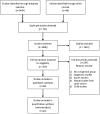Psychological impact of injuries sustained in motor vehicle crashes: systematic review and meta-analysis
- PMID: 27609849
- PMCID: PMC5020848
- DOI: 10.1136/bmjopen-2016-011993
Psychological impact of injuries sustained in motor vehicle crashes: systematic review and meta-analysis
Abstract
Objective: The aim of this meta-analysis was to determine the psychological impact associated with motor vehicle crash (MVC)-related physical injuries.
Design: Systematic review and meta-analysis.
Data sources: Multiple search engines included MEDLINE (via OVID), PsycINFO and Embase, and studies were sourced from scientific journals, conference papers and doctoral theses.
Study selection: A high-yield search strategy was employed. Terms like 'psychological distress', 'depression', 'PTSD' and 'motor vehicle accident' were employed. These key words were run primarily and secondary searches were then conducted in association with the major injury types. Studies needed to compare psychological distress in people injured in an MVC with uninjured controls who had not recently experienced an MVC.
Data extraction: Searches resulted in the identification of 2537 articles, and after eliminating duplicates and studies not meeting inclusion criteria, 24 studies were selected involving 4502 injured participants. These studies were entered into separate meta-analyses for mild to moderate traumatic brain injury (mTBI), whiplash-associated disorder (WAD) and spinal cord injury (SCI).
Results: Elevated psychological distress was associated with MVC-related injuries with a large summary effect size in WAD (0.90), medium to large effect size in SCI (0.69) and small to medium effect size in mTBI (0.23). No studies meeting inclusion criteria were found for burns, fractures and low back injury. Increased psychological distress remains elevated in SCI, mTBI and WAD for at least 3 years post-MVC.
Conclusions: Rehabilitation strategies are needed to minimise distress subsequent to MVC-related physical injuries and the scientific robustness of studies requires improvement.
Keywords: motor vehicle accident; musculoskeletal injury; psychological distress; spinal cord injury; traumatic brain injury.
Published by the BMJ Publishing Group Limited. For permission to use (where not already granted under a licence) please go to http://www.bmj.com/company/products-services/rights-and-licensing/
Figures





Similar articles
-
Technological aids for the rehabilitation of memory and executive functioning in children and adolescents with acquired brain injury.Cochrane Database Syst Rev. 2016 Jul 1;7(7):CD011020. doi: 10.1002/14651858.CD011020.pub2. Cochrane Database Syst Rev. 2016. PMID: 27364851 Free PMC article.
-
School-based education programmes for the prevention of unintentional injuries in children and young people.Cochrane Database Syst Rev. 2016 Dec 27;12(12):CD010246. doi: 10.1002/14651858.CD010246.pub2. Cochrane Database Syst Rev. 2016. PMID: 28026877 Free PMC article.
-
Interventions for eye movement disorders due to acquired brain injury.Cochrane Database Syst Rev. 2018 Mar 5;3(3):CD011290. doi: 10.1002/14651858.CD011290.pub2. Cochrane Database Syst Rev. 2018. PMID: 29505103 Free PMC article.
-
Psychological distress following a motor vehicle crash: A systematic review of preventative interventions.Injury. 2016 Nov;47(11):2415-2423. doi: 10.1016/j.injury.2016.09.006. Epub 2016 Sep 5. Injury. 2016. PMID: 27616005
-
Speed enforcement detection devices for preventing road traffic injuries.Cochrane Database Syst Rev. 2006 Apr 19;(2):CD004607. doi: 10.1002/14651858.CD004607.pub2. Cochrane Database Syst Rev. 2006. Update in: Cochrane Database Syst Rev. 2010 Oct 06;(10):CD004607. doi: 10.1002/14651858.CD004607.pub3. Update in: Cochrane Database Syst Rev. 2010 Nov 10;(11):CD004607. doi: 10.1002/14651858.CD004607.pub4. PMID: 16625608 Updated.
Cited by
-
Violent injury predicts poor psychological outcomes after traumatic injury in a hard-to-reach population: an observational cohort study.BMJ Open. 2017 May 30;7(5):e014712. doi: 10.1136/bmjopen-2016-014712. BMJ Open. 2017. PMID: 28559457 Free PMC article.
-
The qualitative grading of muscle fat infiltration in whiplash using fat and water magnetic resonance imaging.Spine J. 2018 May;18(5):717-725. doi: 10.1016/j.spinee.2017.08.233. Epub 2017 Sep 5. Spine J. 2018. PMID: 28887274 Free PMC article.
-
Biomarkers of autonomic regulation for predicting psychological distress and functional recovery following road traffic injuries: protocol for a prospective cohort study.BMJ Open. 2019 Apr 4;9(4):e024391. doi: 10.1136/bmjopen-2018-024391. BMJ Open. 2019. PMID: 30948569 Free PMC article.
-
The Risk of Hospitalization for Motor Vehicle Accident Injury in Narcolepsy and the Benefits of Stimulant Use: A Nationwide Cohort Study in Taiwan.J Clin Sleep Med. 2019 Jun 15;15(6):881-889. doi: 10.5664/jcsm.7842. J Clin Sleep Med. 2019. PMID: 31138389 Free PMC article.
-
Determinants of post-traumatic stress disorder among survivors of road traffic accidents in dessie comprehensive specialized hospital North-East Ethiopia.BMC Psychiatry. 2023 Mar 30;23(1):218. doi: 10.1186/s12888-023-04673-4. BMC Psychiatry. 2023. PMID: 36997932 Free PMC article.
References
-
- Peden M, Scurfield R, Sleet D et al. . World report on road traffic injury prevention. Geneva: World Health Organization, 2004.
-
- Economic Commission for Europe. Statistics of road traffic accidents in Europe and North America. Geneva: United Nations, 2011.
-
- Ameratunga S, Hijar M, Norton R. Road-traffic injuries: confronting disparities to address a global-health problem. Lancet 2006;367:1533–40. - PubMed
Publication types
MeSH terms
LinkOut - more resources
Full Text Sources
Other Literature Sources
Medical
